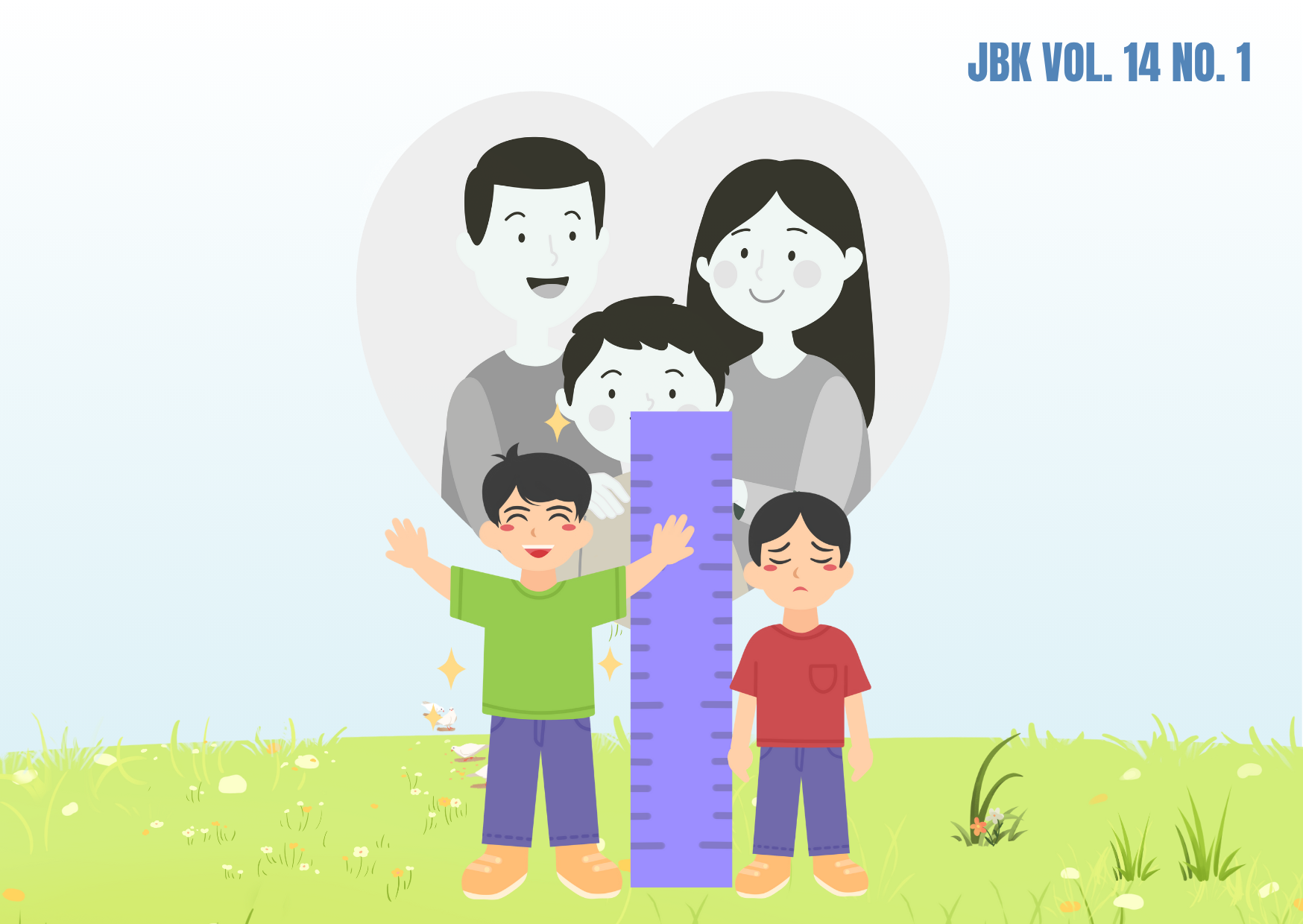DETERMINING FACTORS RELATED TO THE TYPE OF CONTRACEPTIVES IN INDONESIA
Downloads
Aryati, S., Sukamdi, S., and Widyastuti, D., 2019. Faktor-Faktor yang Mempengaruhi Pemilihan Metode Kontrasepsi (Kasus di Kecamatan Seberang Ulu I Kota Palembang). Majalah Geografi Indonesia, 33(1), pp.79–85.
Bakri, Z., Kundre, R., and Bidjuni, H., 2019. Faktor-Faktor yang Berhubungan dengan Pemilihan Metode Kontrasepsi pada Wanita Usia Subur di Wilayah Kerja Puskesmas Ranotana Weru. Jurnal Keperawatan, 7(1), pp.1–10.
Central Bureau of Statistics, 2019. Statistik Indonesia 2019 Statistical Yearbook of Indonesia 2019. Jakarta: Central Bureau of Statistics.
Indonesian Ministry of Health, 2013. Buletin Jendela Data dan Informasi Kesehatan Situasi Keluarga Berencana di Indonesia. Jakarta: Indonesian Ministry of Health.
Indonesian Ministry of Health, 2014. Pedoman Manajemen Pelayanan Keluarga Berencana. Jakarta: Indonesian Ministry of Health.
Indonesian Ministry of Health, 2018. Data dan Informasi Profil Kesehatan Indonesia 2018. Jakarta: Indonesian Ministry of Health.
Liwang, F., Bhargah, A., Kusuma, I.B.H., Prathiwindya, G.G., Indaya, I.G., Putra, S., and Ani, L.S., 2018. Gambaran penggunaan kontrasepsi hormonal dan non hormonal di wilayah kerja UPT Puskesmas Tampak Siring 1. Intisari Sains Medis, 9(3), pp.41–46.
Ningrum, D.A.., Easter, D.Y., and Sugihati, 2018. Faktor-Faktor yang Berhubungan dengan Pemilihan Metode Kontrasepsi Jangka Panjang (MKJP) pada Pasangan Usia Subur di Wilayah Kerja Puskesmas Batang Hari Kabupaten Lampung Timur. Jurnal Dunia Kesmas, 7(4), pp.196–203.
Priyanti, S., and Syalfina, A.D., 2017. Alat Kontrasepsi dan Aktivitas Seksual Sebagai Faktor yang Berpengaruh Terhadap Kejadian Keputihan. Jurnal Berkala Epidemiologi, 5(3), pp.371–382.
Putri, P.K.., Hubeis, A.V, Sarwoprasodjo, S., and Ginting, B., 2019a. Kelembagaan dan Capaian Program Keluarga Berencana (KB): Dari Era Sentralisasi ke Desentralisasi. Jurnal Kependudukan Indonesia, 14(1), pp.1–12.
Putri, R.P., Dewi, R., Sari, P., and Ayu, P.R., 2019b. Perbandingan Faktor-Faktor yang Mempengaruhi Penggunaan Kontrasepsi Intra Uterine Devices (IUD) dan Kontrasepsi Implant pada Wanita Usia Subur di Kecamatan Sukarame Kota Bandarlampung. Majority, 8(2), pp.120–124.
Rizali, M.I., Ikhsan, M., and Salmah, U., 2013. Faktor yang Berhubungan Pemilihan Metode Kontrasepsi Suntik di Kelurahan Mattoangin Kecamatan Mariso Kota Makassar. Media Kesehatan Masyarakat Indonesia, pp.176–183.
Saragih, I.M., Suharto, and Nugraheni, A., 2018. Faktor-Faktor yang Berhubungan dengan Pemilihan Penggunaan Metode Kontrasepsi Non-IUD pada Akseptor KB Wanita Usia Subur di Kelurahan Bandarharjo Semarang Utara. Jurnal Kedokteran Diponegoro, 7(2), pp.1236–1250.
Setiasih, S., Widjanarko, B., and Istiarti, T., 2016. Analisis Faktor-faktor yang Mempengaruhi Pemilihan Metode Kontrasepsi Jangka Panjang (MKIP) pada Wanita Pasangan Usia Subur (PUS) di Kabupaten Kendal Tahun 2013. Jurnal Promosi Kesehatan Indonesia, 11(2), pp.32–46.
Sriwahyuni, E., and Wahyuni, C., 2012. Hubungan antara Jenis dan Lama Pemakaian Alat Kontrasepsi Hormonal dengan Peningkatan Berat Badan Akseptor. The Indonesian Journal of Public Health, 8(3), pp.112–116.
Syukaisih, 2015. Faktor-Faktor yang Berhubungan dengan Pemilihan Kontrasepsi di Puskesmas Rambah Samo Kabupaten Rokan Hulu. Jurnal Kesehatan Komunitas, 3(1), pp.34–40.
Triyanto, L., and Indriani, D., 2018. Faktor yang Mempengaruhi Penggunaan Jenis Metode Kontrasepsi Jangka Panjang (MKJP) pada Wanita Menikah Usia Subur di Provinsi Jawa Timur. 11(2), pp.32–46.
Weni, L., Yuwono, M., and Idris, H., 2019. Determinan Pemilihan Metode Kontrasepsi Jangka Panjang Pada Akseptor KB Aktif di Puskesmas Pedamaran. Scientific Periodical of Public Health and Coastal Health, 1(1), pp.9–16.
Winner, B., Peipert, J.F., Zhao, Q., Buckel, C., Madden, T., Allsworth, J.E., and Secura, G.M., 2012. Effectiveness of Long-Acting Reversible Contraception. The New England Journal of Medicine, 366(21), pp.1998–2007.
Yulidasari, F., Lahdimawan, A., and Rosadi, D., 2015. Hubungan Pengetahuan Ibu dan Pekerjaan Ibu dengan Pemilihan Kontrasepsi Suntik. Jurnal Berkala Kesehatan, 1(1), pp.33–36.
Copyright©2022 Jurnal Biometrika dan Kependudukan (Journal of Biometrics and Population)
This work is licensed under a Creative Commons Attribution-NonCommercial-ShareAlike 4.0 International License.
1. Copyright of all journal manuscripts is held by the Jurnal Biometrika dan Kependudukan.
2. Formal legal provisions to access digital articles of the electronic journals are subject to the provision of the Creative Commons Attribution-ShareAlike license (CC BY-NC-SA), which means that Jurnal Kesehatan Biometrika dan Kependudukan to keep, transfer media/format, manage in the form of databases, maintain, and publish articles.
3. Published manuscripts both printed and electronic are open access for educational, research, and library purposes. Additionally, the editorial board is not responsible for any violations of copyright law.



































